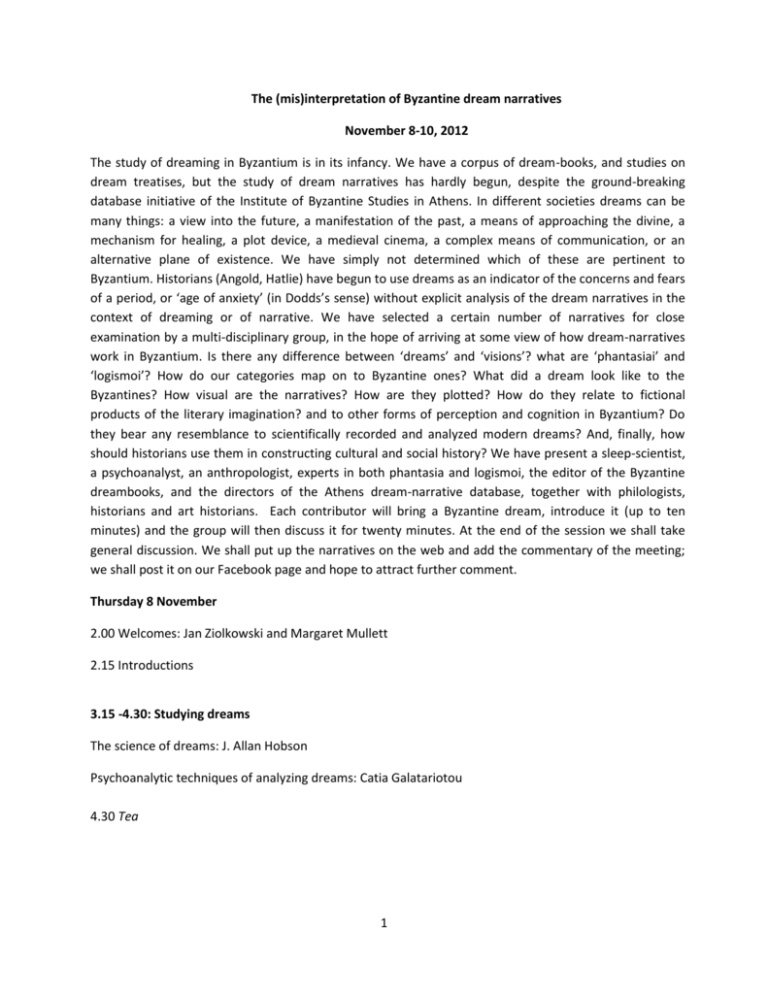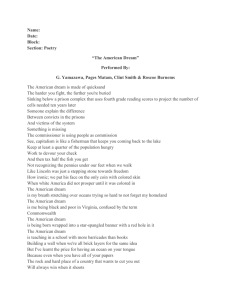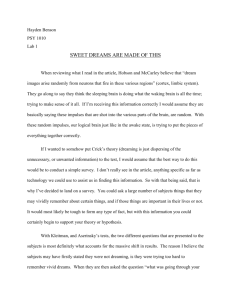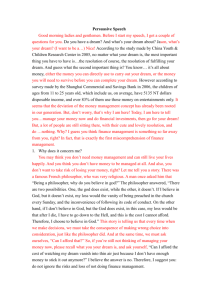DreamClinicProgram
advertisement

The (mis)interpretation of Byzantine dream narratives November 8-10, 2012 The study of dreaming in Byzantium is in its infancy. We have a corpus of dream-books, and studies on dream treatises, but the study of dream narratives has hardly begun, despite the ground-breaking database initiative of the Institute of Byzantine Studies in Athens. In different societies dreams can be many things: a view into the future, a manifestation of the past, a means of approaching the divine, a mechanism for healing, a plot device, a medieval cinema, a complex means of communication, or an alternative plane of existence. We have simply not determined which of these are pertinent to Byzantium. Historians (Angold, Hatlie) have begun to use dreams as an indicator of the concerns and fears of a period, or ‘age of anxiety’ (in Dodds’s sense) without explicit analysis of the dream narratives in the context of dreaming or of narrative. We have selected a certain number of narratives for close examination by a multi-disciplinary group, in the hope of arriving at some view of how dream-narratives work in Byzantium. Is there any difference between ‘dreams’ and ‘visions’? what are ‘phantasiai’ and ‘logismoi’? How do our categories map on to Byzantine ones? What did a dream look like to the Byzantines? How visual are the narratives? How are they plotted? How do they relate to fictional products of the literary imagination? and to other forms of perception and cognition in Byzantium? Do they bear any resemblance to scientifically recorded and analyzed modern dreams? And, finally, how should historians use them in constructing cultural and social history? We have present a sleep-scientist, a psychoanalyst, an anthropologist, experts in both phantasia and logismoi, the editor of the Byzantine dreambooks, and the directors of the Athens dream-narrative database, together with philologists, historians and art historians. Each contributor will bring a Byzantine dream, introduce it (up to ten minutes) and the group will then discuss it for twenty minutes. At the end of the session we shall take general discussion. We shall put up the narratives on the web and add the commentary of the meeting; we shall post it on our Facebook page and hope to attract further comment. Thursday 8 November 2.00 Welcomes: Jan Ziolkowski and Margaret Mullett 2.15 Introductions 3.15 -4.30: Studying dreams The science of dreams: J. Allan Hobson Psychoanalytic techniques of analyzing dreams: Catia Galatariotou 4.30 Tea 1 5.00-7.30: The Byzantine theory of dreams A theoretical dream in Clement of Alexandria, introduced by Aglae Pizzone Evagrius’s vagabond demon, introduced by Columba Stewart (cf John Klimax, Step 3, suggested by Susan Harvey, and Palladius's account of Evagrius's dream, offered by Robin Darling Young ) A dreambook dream, introduced by Steven Oberhelman 8.00 Dinner at 3026 ½ R St NW Friday 9 November 9.00-11.00: Incubation dreams Two Pege miracle dreams, introduced by Alice-Mary Talbot A modern dream and incubation visions, introduced by Henry Maguire Two Thekla miracle dreams, introduced by Scott Fitzgerald Johnson 11.00 Coffee 11.30 -2.30: Late sixth- and early seventh-century dreams A vision in John of Ephesus, introduced by Susan Harvey A dream in Eustratios, VEutychii, introduced by Aglae Pizzone 12.30 Lunch in the Refectory 1.30: contd A dream from the Life of Mar Qardagh, introduced by Grigory Kessel Discussion of the three dreams 2.30-4.30: Women’s dreams, dreams of women A woman’s dreams in the Life of Andrew the Fool, introduced by Christine Angelidi Dreams in the Life of Eirene of Chrysobalanton, introduced by Niki Tsironis 2 Representing dreams: images introduced by Ioli Kalavrezou 4.30 Tea 5.00-7.00: Politics and sex A political dream: the dream of Caesar Bardas in the Life of Ignatios, introduced by Andrei Timotin Dreams in the life of Basil the Younger, introduced by Matina McGrath An erotic dream in Theodore Daphnopates (and Psellos on erotic dreams), introduced by Stratis Papaioannou 7.00 for 7.30 Dinner in the Refectory Saturday 10 November 9.00-11.00: World of Psellos A dream in Psellos’s enkomion on Keroularios, introduced by David Jenkins Dreams in Psellos’s enkomion on his mother, introduced by Catia Galatariotou A dream in the Life of Lazaros of Galesion, introduced by Floris Bernard 11.00 Coffee 11.30-1.30: History and fiction A fictional dream in Stephanites kai Ichnelates, introduced by Alison Noble Stephen’s dream of Nikon in the Vita Niconis, introduced by Leonora Neville Dreams in history: The abbot's dream near the beginning of the Vita Basilii and the campaigning Sultan's dream in the Alexiad, introduced by Emmanuel Bourbouhakis 1.30 Lunch in the Refectory 2.30-4.30: Letters and lives 3 A dream in John Tzetzes, ep. 58, introduced by George Calofonos Two dreams in the Life of Cyril Phileotes, introduced by Margaret Mullett Solomon’s couch at the Peribleptos in Ochrid, introduced by Rossitza Schroeder 4.30 Tea 5.00 Final discussion, introduced by Barbara Tedlock: the anthropologist’s view 6.00 Prosecco in the Byzantine courtyard Participants Christina Angelidi (Athens) Floris Bernard (Gent and DO) Emmanuel Bourbouhakis (Princeton) George Calofonos (Athens) Beatrice Daskas (Milan and DO) Catia Galatariotou (London) Susan Ashbrook Harvey (Brown) J. Allan Hobson (Harvard) David Jenkins (Princeton) Scott Johnson (Georgetown and DO) Ioli Kalavrezou (Harvard) Grigory Kessel (Marburg and DO) Zoie Lafis (CHS) Henry Maguire (Johns Hopkins) Stamatina McGrath (DC) Margaret Mullett (DO) Gregory Nagy (CHS) Leonora Neville (Madison) Alison Noble (DC) Steven Oberhelman (Texas A&M) Stratis Papaioannou (Brown) Aglae Pizzone (Durham) Philip Rousseau (CUA) Rossitza Schroeder (Pacific School of Religion and DO) Columba Stewart (Minnesota) Alice-Mary Talbot Barbara Tedlock (Buffalo) Andrei Timotin (EHESS and Bucharest) Emanuela Timotin Niki Tsironis (Athens) Robin Darling Young (Notre Dame) Jan Ziolkowski (DO) 4








